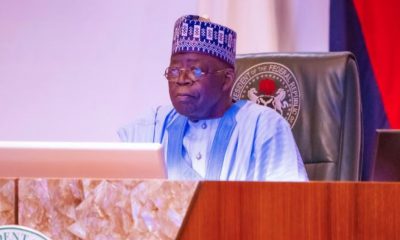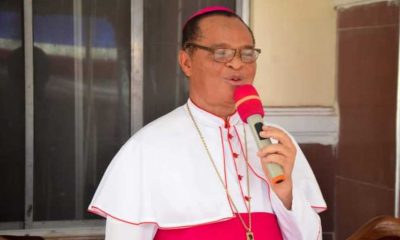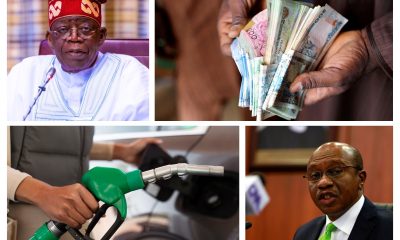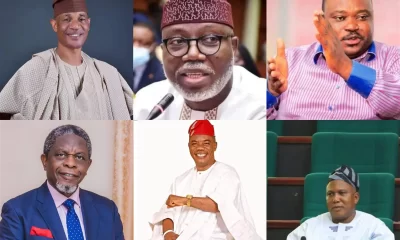Uncategorized
New governors slash domestic debt by over N111 billion in three months
Published
4 months agoon

At least 11 out of the 18 newly elected governors successfully reduced their inherited domestic debts by a significant N111.35 billion in the short span from June to September 2023.
This drop further contributed to a notable decrease in the collective debt of these 18 governors, witnessing a drop of approximately N46.79 billion within three months.
An analysis of the subnational domestic debt reports, as released by the Debt Management Office (DMO), indicates a downward shift in the total debt figures for these governors. The total debt, which stood at N2.52 trillion as of June 2023, saw a reduction to N2.47 trillion by September 2023.
The total debt of these 18 governors makes up 43.03% of the total subnational domestic debt of N5.74 trillion by the third quarter of 2023.
Conversely, four of the newly elected governors recorded an increase in their domestic debt, amounting to N20.56 billion, during the same timeframe.
Notably, for certain states like Kano, the domestic debt data was available only up to December 31, 2022, while for Katsina and Rivers states, the data extended up to March 31, 2023.
Consequently, while these three states were accounted for in the overall total debt calculation for the 18 governors, they were not included in the detailed breakdown of governors who either augmented or diminished their state’s debt in this analysis.
The 11 new governors that decreased their domestic debt include Alex Otti of Abia state, Umo Eno of Akwa Ibom state, Sheriff Oborevwori of Delta state, Francis Nwifuru of Ebonyi state, Peter Mbah of Enugu state, and Umar Namadi of Jigawa state.
READ ALSO: Obi faults Tinubu, NASS over securitisation of N7.3tn CBN debt
Others include Uba Sani of Kaduna State, Nasir Idris of Kebbi State, Mohammed Bago of Niger State, Ahmad Aliyu Sokoto of Sokoto State and Agbu Kefas of Taraba State.
In total, these 11 governors took an inherited debt of N1.46 trillion as of June 2023 to N1.35 trillion as of September 2023. The table below provides a breakdown of each state’s debt:
The four new governors that increased their domestic debt are Hyacinth Alia of Benue state, Bassey Otu of Cross River state, Caleb Mutfwang of Plateau state and Dauda Lawal of Zamfara state.
Together, they pushed their total domestic debt from N644.91 billion as of June 2023 to N665.46 billion as of September 2023. Leading the trend is Plateau state, with a 7% increase in three months, getting about 58% of the total fresh loans by these four new governors. The table below provides a breakdown for each state:
The current trend observed among some of Nigeria’s newly elected governors, where a significant number are reducing their inherited domestic debts, presents a scenario open to two primary interpretations.
On one hand, this trend could be indicative of a deliberate and strategic effort by these governors to lower their states’ debt profiles, showcasing a commitment to fiscal prudence and sustainable economic management.
On the other hand, it is also plausible that the observed reduction in debt levels is not necessarily a result of proactive debt-reduction strategies, but rather a consequence of routine debt servicing and repayments. In this context, the reduction could be more reflective of the governors’ initial phases of administration, where they are yet to fully establish their financial strategies or undertake new debt-incurring projects or policies.
Given these possibilities, the true nature of the debt reduction among these governors could either be a strategic decision aimed at improving fiscal health or a temporary phase of regular debt servicing, which could potentially change as the governors’ terms progress and new financial policies are implemented.
However, in a significant turn of events that could reshape the political landscape, the Supreme Court of Nigeria is set to deliver judgments today (Friday) on appeals concerning the election outcomes of seven governorship seats.
This critical decision encompasses five of the 18 newly elected governors, specifically from Kano, Zamfara, Plateau, Ebonyi, and Cross River states. Additionally, the apex court will also rule on appeals for the governorship elections in Bauchi and Lagos states, bringing the total to seven potentially impactful judgments.
This follows the recent dismissal by the Supreme Court of three separate appeals lodged by candidates and parties from the All Progressives Congress (APC), Young Progressives Congress (YPC), and New Nigerian Peoples Party (NNPP) against the election of Akwa Ibom State Governor, Umo Eno.
Particularly noteworthy are the judgments pending for Kano and Plateau These cases have garnered heightened public interest due to the lower courts’ previous decisions that resulted in the sacking of the incumbent governors in these states. The outcomes of these appeals are eagerly anticipated, as they are expected to have significant implications for the political dynamics and governance in these regions.
Amidst these legal battles, there have been critical observations and remarks regarding the role of the judiciary in political processes. The sacking of opposition governors by the courts has sparked debates and concerns about the independence of the judiciary. Critics have described these actions as potential instances of the executive arm exerting influence over the judiciary, using it as a tool to gain control in certain states.
You may like


Reduce size of govt appointees — Group advised FG, states


FG to audit N23trn Ways and Means debt, curb borrowing


ASUU: FG commences payment of withheld salaries


Corruption has gone beyond scale, measure in Nigeria—Catholic Bishop


Subsidy removal, cash scarcity, other events that shaped Nigeria’s economy in 2023


FG targets two million barrels of crude per day in 2024
Trending

 Health & Fitness3 days ago
Health & Fitness3 days agoMalaria Vaccines in Africa: Pastor Chris Oyakhilome and the BBC Attack

 Featured7 days ago
Featured7 days agoPolice reportedly detain Yahaya Bello’s ADC, other security details

 Education1 week ago
Education1 week agoEducation Commissioner monitors ongoing 2024 JAMB UTME in Oyo

 Aviation5 days ago
Aviation5 days agoWhy some airlines are avoiding Nigeria’s airspace–NAMA

 Business1 week ago
Business1 week agoMaida, university dons hail Ibietan’s book on cyber politics

 Business7 days ago
Business7 days agoDebt servicing gulps 56% of Nigeria’s tax revenue, says IMF

 Crime1 week ago
Crime1 week agoPolice take over APC secretariat in Benue

 News6 days ago
News6 days agoOndo APC guber hopefuls reject primary poll

